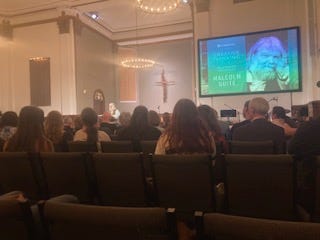Welcome to Firelight! In case you’re new here, I write about my unconventional life with my husband and two sons, the older of whom has non-speaking autism. In this edition, I share a wintry scene from nine months ago.
Snow began to fall around six o’clock last night. It is now nearly noon and we have roughly five inches on the ground. A little while ago, my husband and younger son went outside to build a snowman. My older son, who is diagnosed with non-speaking autism, prefers to be indoors in thirteen-degree weather. He watches his father and brother from the window while I type and sip coffee.
It’s a late start to this snow day for us—Milo was up until four in the morning. He was emotional and I was emotional. Eventually, I handed him a blanket and told him to rest on the couch. I reclined in a nearby chair and dozed. Milo never closed his eyes, of course. Even in the middle of the night, bright snow illuminated the dark window. “This snow better not be keeping you awake,” I muttered, pulling my own blanket up to my chin. I burrowed into the warmth of soft cotton and closed my eyes.
It is easy to be smug when things are going well, isn’t it? Parents of autistic children fall prey to this same vice. No one tastes smugness at four o’clock in the morning. Instead, cycles of self-blame begin: I didn’t give him enough attention. We should’ve eaten at the dinner table instead of parking in front of the television again. I forgot to blend a green smoothie for him today. My brain twists to solve the algebra of my son’s sleepless nights. Maybe he needs more therapy. Maybe he needs less therapy. I kick my blanket off and write notes in my day planner to share with my husband in the morning. It all feels very urgent. If he can’t sleep, how will he learn and grow? If I can’t sleep, how will I help my family? How will we live? It feels urgent because it is urgent.
I lay back down on the couch and exhale. Unblinking, I remind myself of how blessed I am—even in these moments of earthly suffering. I am warm. I am safe. I have a family who loves me. I have food to eat. I have electricity. I have the Internet. I have this pillow. This blanket. These comfortable pajamas. I am not on the street. I am not fighting for my life in below-freezing temperatures. As I go through this exercise, my heart begins to change: my focus is no longer on the (still-true) reality that I am denied sleep. My focus, instead, lingers on the good.
There have been several times, in the last twelve years, I’ve told my husband that I need to give up writing. There is a great deal I’ve left unsaid in that sentence. I’m going to type that again. There is a great deal I’ve left unsaid in that sentence. There are words spoken in haste and burnt dinners served up with apologies. I fight for every word I write. The problem, for me, isn’t a lack of ideas or motivation. The problem, for me, is a lack of time and margin. I tried to finish this newsletter last night, after a difficult week of unnameable things, but I fell asleep typing. I knew the conclusion I wanted to write. The words were right there for the taking. But my tired body battled my willing mind, showing no mercy. Normally, I do whatever I need to do to force my mind to overpower my body. Last night, however, my mind lost.
And, in a twist of déjà vu, Milo was up at four o’clock again. I actually thought about staying up after I sent him back to bed. He’d been through the produce; I located a hollowed-out banana peel, still mostly intact, on the floor. He’d pinched the peel to create a small opening and squeezed out the banana, a little at a time. I thought about pulling the compost jar out from under the sink. I can make my 5am deadline for the newsletter if I stay up, I thought. I thought about twisting the lid off the jar and my fingers felt numb. I couldn’t bring myself to toss the banana peel, either. I just stared at it for a long time. Maybe I should go back to bed if deciding whether to toss or compost a banana peel is causing an existential crisis, I thought. I left the peel on the counter, a decision deferred, and went back to bed for a couple more hours.
My husband tells me: You can’t give up writing. He never says: Don’t give up writing. There is a difference in can’t and don’t. Don’t implies something much less urgent. Can’t, on the other hand, implies a lack of options. Knowing that my husband doesn’t feel it is an option for me to give up writing fills me with great hope for the future.
Last night, Tyson and I attended a Malcolm Guite lecture and poetry reading. During the Q&A portion of the evening, I raised my hand. “What is your perspective on writing through a crisis of faith?” I asked. Then, feeling that my question was perhaps a little too personal, I quickly added: “We have Lewis’ A Grief Observed as an example of writing through a crisis of faith. I was just wondering if you had a take on that.”
Guite agreed that Lewis was a good example of writing through crisis, but reminded me that the Bible included the first example of writing through crisis—the Psalms. There, Guite noted, “God gives us the language of crisis.” He added a disclaimer about making sure you’re willing to mold that type of writing into something readable later on. Finally, he nodded soberly: “Yes. Write through a crisis.”
As Luther once said, “Here I stand; I can do no other.”
Please like, comment, and share if you enjoyed this post. Thank you for reading!






Very insightful, Heather!
This piece is full of treasures. I too feel a lack of margin, a scarcity paired with guilt that it's self-induced because I constantly fail to say no. Thank you for sharing Malcolm Guite's response to your beautiful question.